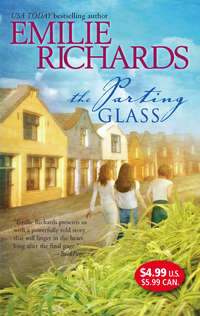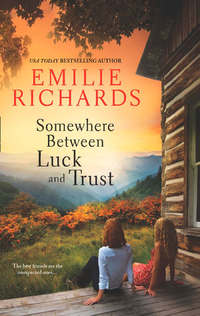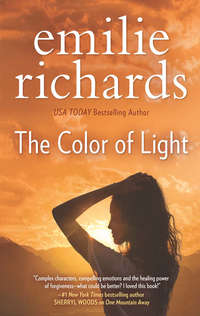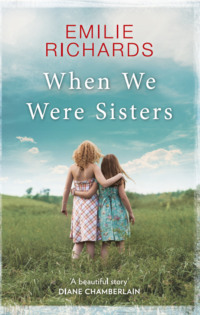
Полная версия
Fox River
“We aren’t going to fix anything with you living here. It’s the next step toward a divorce. Is that what you want?”
She was saved from having to answer by Callie’s voice floating up from the barn. She lowered hers again. “If you want to see Callie tonight, this is your chance. And we’ve said enough, don’t you think?”
“Not nearly.”
“She’ll know you’re here. She’ll see your car. You can’t ignore her.”
“Fine, Julia. I’ll go see her. But you stay here until Maisy comes to rescue you. For once, let me be her father without your help.”
“Bard…”
“Save it.”
A cool breeze fanned her side where he had been sitting, and leaves crackled under his feet. “Tell you what, if you can think of any reason to see me again, you know where to reach me. I’ll wait for instructions.”
She heard his footsteps on the cobblestone path. She lowered her chin and stared sightlessly at the ground.
Maisy watched her granddaughter run to her father, then stop several feet away, as if she was aware he might not want to see her.
“Hi, Daddy.”
“Callie.” He nodded his head. He didn’t reach for her, but he didn’t move away, either. “Your mother said you were checking on Feather Foot. She’s doing all right in there?”
“It’s so neat. Jake works there every day, and he can keep her company while I’m in school. She has everything she needs.”
Bard looked at Maisy. “Sounds like you have my family all tucked in here.”
Maisy didn’t take the bait. “We’re glad to lend a hand.”
“I made a B on my history report.” Callie moved a little closer. “The one about Mosby’s Rangers.”
“That’s good.” He sounded neither critical nor enthused. Clearly his mind wasn’t on the conversation.
Callie tried again. “A B is good. It’s better than last time, right?”
“That’s not the way to look at it, Callie. A B is okay. An A would be better.”
Callie didn’t seem surprised. She made a face. “You mean I’m not supposed to be happy?”
“You can be happy.” He seemed to focus on her. “A B is good enough to be happy about.”
“Did you always get As?”
“Pretty nearly all the time.”
Her face fell. “Maybe I’m not that smart.”
Maisy was angry enough at this exchange to intervene, but his next words stopped her. “You’re smart enough to make me happy.”
Callie giggled. He stepped forward and smoothed her hair. “Walk me to my car.”
“Where’s Mommy?”
Maisy frowned. Where was Julia?
Bard turned to her. “Julia’s sitting in the garden. It’s getting colder. She’ll need some help getting back inside.” He started toward the black BMW, which was parked near the barn, and Callie tagged along beside him.
“He looks like he ran into a hornet’s nest,” Maisy said when Jake joined her. “He left Julia in my garden.”
“He’s a man with a number of strengths. Dealing with feelings isn’t one of them.”
“I want to slap him when he makes Callie ashamed of herself.”
“Maisy, he struggles. Anyone can see that.”
She felt reprimanded, and it wasn’t the first time. Lately she had felt the subtle sting of Jake’s disapproval more and more. “She’s just a little girl.”
“She’s a lot stronger than you give her credit for. They have to work out their own relationship.”
“I know that.” She sounded hurt, although she had hoped not to.
“Do you? You protect everyone you love. Some people would say you smother them.”
“Do I smother you, Jake?” The hurt was still there.
“Only when I let you.”
She knew there was nothing else she could say. He squeezed her arm, as if to comfort her. “I’ll get Julia. I know you’ll want to help Callie get ready for bed.”
Maisy watched him walk away. Finally she drew a deep breath and realized it was the first she had taken since his answer.
8
“Mommy, when I shut my eyes, I can still see light. Can you see light?”
“I don’t think so. Turn me toward the lamp.”
From the noise she made, Callie thought that was funny. She stood on the bed and put her small hands on Julia’s shoulders; then she guided her. “Can you see it?”
“When you close your eyes, you’re still getting light through your eyelids. Whatever is wrong with my eyes, the light doesn’t penetrate.”
“Daddy says something’s wrong with your head. But not because you hit it.”
Julia was glad Bard had reassured Callie of that much, at least. “It’s hard to understand.”
“If you just try real hard, maybe you can see.”
Julia heard Bard in her daughter’s words. She positioned herself to sit on the bed. “Remember when you were learning to read, and no matter how hard you tried, you still couldn’t make any sense out of all those letters? Remember how you had to have a special teacher who knew what your problem was and how to help you with it?”
“I’m not even nine yet, Mommy,” Callie said with exaggerated patience. “I remember.”
Julia put her arms around her daughter, or rather, she put her arms around empty space until Callie snuggled against her. “Well, it’s the same way for me. No matter how hard I struggle to see, I can’t. I’m going to need a special teacher to help me see again, somebody who knows what my problem is.”
“A seeing teacher?”
Julia wished it were that easy. “A psychologist. A counselor.”
“I’m learning to read. Maybe you’ll learn to see, too.”
“You’re doing very well with your reading. And because it’s harder for you, it’ll mean more.”
“I had to read out loud in class yesterday.”
Julia had an agreement with Callie’s teacher that this would never happen. “Why?”
“We had a substitute. Mrs. Quinn was at a meeting. I just told her it was hard for me, so she let me stop. But the other kids laughed.”
“What did you do?”
“I didn’t have time to do much. Leroy Spader got up to read and fell over somebody’s foot. Then they laughed at him, instead.” Callie paused. “But I didn’t laugh. I helped him get back up.”
“That was nice.” Julia remembered Leroy. Usually when the class laughed at Callie, cocky little Leroy was the leader.
“Then I pushed him.”
“You didn’t!”
“Just back into his seat. That’s all. So he wouldn’t fall again.”
Julia hugged her daughter harder. “No more pushing, Callie. I know Leroy provokes you, but that’s not going to help anything.”
“Why, because I’m supposed to be a lady?”
Bard’s words again. “Not at all. Because it’s the right thing to do. Girl or boy.”
“Pickles!”
“Pickles?”
“That’s what Tiffany says when she’s mad.”
“You’d better get under the covers now, sweetums.”
“Can’t. You have to stand up first. You’re on my blanket.”
Julia got to her feet. “I’m going to tuck you in. Just let me know if I succeed.”
“I like your room. I’m glad I’m sleeping here.”
Julia had always liked this room, too, and it hadn’t surprised her that Callie chose it. The bedroom was large and airy, with windows on two sides and climbing trees just out of reach. At Callie’s age, she had asked Maisy to paint it a sunny yellow, and it had remained that way until she was a teenager. Then Julia couldn’t darken the walls enough to suit herself. In an uncharacteristic moment of parental defiance, Maisy had refused to let her paint them black, so she and her mother had compromised on navy blue.
Now the room was a soft lavender, or had been last time she’d been able to see it. “What color are the walls in here, Callie?”
“Purple.”
“Light purple?”
“Uh-huh.”
“I painted it this color my first year in college.”
Christian had helped, and so had Fidelity. Julia felt a fresh stab of pain. Callie would never know her biological father had painted the ceiling just above her head. Or that her mother’s best friend had painted the trim, carelessly slopping more on the walls than the window frames until they’d made her sit and supervise.
Callie wouldn’t know that she had been conceived inside these very walls, just days before Christian was convicted of Fidelity’s murder and sentenced to a life away from the daughter he didn’t know he had.
“Purple makes me sleepy,” Callie said. She sounded like a child drifting to the land of Nod.
“I can’t read to you, but I could tell you a story.”
“I don’t think I can…stay awake.”
Julia sat on the side of the bed again and felt for Callie’s face. Then she landed a kiss on her daughter’s forehead. “I’ll tell you a longer one tomorrow to make up for it.”
“You two ready for lights out?”
Julia hadn’t heard her mother’s approach. “This is one tired little girl.”
Maisy’s footsteps ringed the bed. “Good night, princess. We’ll see you in the morning.”
“Night…Leave the door open.”
“We will.” Julia felt Maisy take her hand.
In the hallway, Maisy put her arm around her daughter. “You’re ready for bed, too, aren’t you?”
“I am tired.”
At the bottom of the stairs, after a long, slow descent, Maisy spoke again. “How did things go with Bard?”
Julia realized her mother needed to know at least part of what had occurred. “Bard’s taking this personally. And I guess I antagonized him.”
“I’m sorry.”
“Are you?”
“I don’t want your life to be any harder than it already is.”
“He pulled out all the stops.” And inside she was still trembling from the dissonant roar.
“Julia, whatever you decide, you know it’ll be all right with me, don’t you? I’m not trying to make you do anything.”
Julia thought about that. Maisy had always been a permissive parent. Sometimes Julia thought the absence of rules had been a sneaky but useful form of control. With few parental limits, Julia had been forced to choose her own so carefully that when she’d erred, it had usually been on the side of caution.
“You’re not forcing me to do anything I don’t want to do, but you want me here, Maisy. You’ve made it clear.”
“I won’t lie. I love it.”
“Am I imagining it, or have you been clearing out the hallway?”
“I’ve just been making paths. Lord knows, we’ve needed them for years.”
Julia allowed herself to be steered slowly toward the downstairs bedroom. Since finding her way through the halls of Gandy Willson, she had grown more confident. She still shuffled, but no step was an anxiety attack.
“I’ve laid out a nightgown for you. All your bathroom things are in a row on the shelf above the radiator. Will you need help?”
“I’ll manage.”
“Then how about if I leave you in the bathroom first, then come back for you in a few minutes? Unless you’re planning to take a bath?”
“I’ll shower in the morning.”
Julia found everything she needed and got ready for bed. Back in her room, she felt along the foot rail of the bed for her nightgown.
“I can leave you alone to undress and come back later,” Maisy said.
“Thanks, but I think I’m going right to sleep.”
“Actually, I need your help with something.”
“Then stay while I change.”
Julia heard the bedsprings creak. The bed, like nearly everything else in the house, was an antique, which Maisy had always called “preloved.”
Maisy was silent while Julia undressed, until she got down to her bra and panties. “Honey, you’re so thin.”
“I’m at a disadvantage here. I can’t see you, remember?”
“Trust me, thin is not what you’d see.”
“I haven’t been hungry since the accident. But I’ll gain it back.”
“It’s very Audrey Hepburn.”
Julia managed a smile. “Do you remember all the times we watched My Fair Lady when I was growing up?”
“It was one of the few things we agreed on.”
Julia would have liked to be able to argue, but Maisy was right. They had shared so little, not just during the normal turbulence of adolescence, but throughout Julia’s childhood. She had never quite understood it. They were very different people, but they loved each other. They loved Ashbourne, too, and, in their individual ways, the culture of Ridge’s Race. But for all that, Julia had never felt they stood on common ground, or even that they could reach each other across the divide.
At Callie’s birth, her first prayer had been that her own daughter wouldn’t drift from her as she had drifted from Maisy.
“I’ve thought about this a lot.” Maisy must have shifted, because the springs creaked once more. “Your hand slipped out of mine when you were little, and I never found it again.”
Julia slid the nightgown over her head and felt its familiar swish against her hips. But the whisper of silk was the only familiar thing about the last moments.
“I love you, Maisy,” she said tentatively. “You know I do.”
“That’s never been an issue.”
“I don’t know what else to say. We’re very different. Maybe I’m more like my father?”
“In little ways, maybe. He wasn’t a man to talk about his feelings.”
“Neither are you,” Julia said gently. “Although you will talk about any other subject under the sun.”
“Harry had a way of drawing people to him that neither of us has mastered. He walked into a room and the light went on. Not because he worked at being charming, because he was so confident.” She paused. “Powerful. He was powerful, and anyone who met him wanted to live in his sphere.”
Julia found her way around the bed and sat on the edge. “I don’t remember anything about him.”
“I know. Jake was all the father you ever really knew.”
“Enough father for anyone. The best.”
Julia suspected that the window into her mother’s feelings was closing. But it had been a beginning and something to ponder. “You said you needed my help?”
Maisy didn’t answer immediately. When she did, she almost sounded embarrassed. “Julia, I’m writing a novel.”
Julia supposed if any of the mothers of her friends had admitted such a thing, their daughters would have been stunned. The mothers of Ridge’s Race gave charity teas and served on committees, they shepherded children and grandchildren to horse and pony shows and steeplechase events, entertained friends, oversaw the baking of ham and the assembly of salads for tailgate parties. They did not, for the most part, pursue their muse.
Maisy had always pursued hers with a vengeance.
Julia thought back to her mother’s last creative attempts. “You got tired of sculpture?”
“I was a failure.”
“Not so. I thought some of the things you did were interesting.”
“Julia, we both know what interesting means in the art world. Spare me false praise.”
“I liked the bust of Callie. I really did.”
“You were the only person who knew it was Callie, and that’s only because you let her pose for me.”
“So you’ve moved to writing. Didn’t you try your hand at poetry when I was in college?”
“No matter what I wrote, I rhymed. I shamed myself.”
“Well, if you’re telling me this because you want my approval, you know you have it. I think it’s great.”
“I’m glad to hear that. I want to read what I’ve written to you.”
Julia sobered. “I’m not going to be much of an audience, Maisy.”
“I know you have a lot on your mind.”
Maisy had tried to be honest with her. Now Julia tried to be honest with her mother. “I feel like I’m putting my life back together, or taking it apart, I’m not sure which. I feel like I’m curled up in a hard little ball, the way a porcupine does when it’s under attack. Everything that’s happening inside me right now is centered around me and my life. I feel selfish, but there it is. I don’t know if I even have the ability to think about anybody else.”
“I understand.”
“I’m glad.”
“I still would appreciate it if you listened to my story. I’ll tell you why,” Maisy continued before Julia could object. “I think you need something outside yourself to think about. Just for a small part of each day. I understand what you’re going through. I do, as well as anyone could. But I also know you need a break from the crisis, and it’s going to be hard to get one. You can’t read. You can’t paint. You can’t ride. You can listen to music or television, but I think while you do, you’ll be worrying and digging away at the things inside you.”
“That’s all I’m good for right now.”
“Your heart and soul need a resting place. You need to heal a little before you move on to the next thought. You need time to heal. Is this making any sense?”
To Julia, what made sense was that her mother, in her own confusing way, was trying to help her. Right at the beginning Maisy had offered her a home, solace, the use of Maisy’s own eyes and hands as she cared for her. Now she was offering two things more. Respite and a piece of Maisy’s own heart. Julia, as an artist, understood that every creative endeavor, even the most amateur, was a gift of self.
How could she refuse to listen?
“I don’t think you’ll find it that painful, Julia,” Maisy said dryly. “You should see the look on your face. I swear.”
“Okay, maybe you’re right. I’d like to do something for you if I can, in return for everything you’ve done. But do you want me to give my opinion? Because that might be tough on both of us.”
“Not really. Mostly I need a captive audience. Come here and get under the covers. It’s cold, and you’re not wearing enough.” Maisy stood, and the mattress lifted.
“When did you want to start?” Julia pulled the covers back and got under them. She felt the way she had as a little girl, waiting for her mother to tuck her in. Only she was a mother now and her own daughter was sleeping upstairs.
“Right now suits me.”
Julia’s heart sank. The day had been long and difficult, and she’d hoped for a reprieve. “A bedtime story?”
“It’s the quiet time of day. And maybe it will help you fall asleep.”
Julia struggled to keep her voice light. “Maybe I’ll fall asleep while you’re reading. What will that tell you?”
“That you’re tired. Only that you’re tired.”
“What kind of novel is it?”
“A romance, I think. At least that’s how it seems to be shaping up. When it comes right down to it, though, that’s what I like to read. I need a happy ending.”
“You’ll guarantee one?”
Maisy paused. “Can’t. These characters have a mind of their own. It’s going like gangbusters.”
Julia was afraid to think what that said about quality. Maisy’s pottery had always gone like gangbusters, too. “You used to read to me when I was little. Every night. It was one of the things I loved best about my childhood.”
“I used to tell you to settle back and let the story take over. Do you remember?”
“Yes.”
“Julia, settle back tonight and let the story take over. Forget everything else that happened. There’ll be plenty of time to remember it all again in the morning.”
“You have the book?”
“The first chapter’s right here.” The rustle of pages followed her words. Julia heard a chair scraping the floor, then the creak of a cane seat as Maisy lowered herself into it.
“Does Jake know about this?”
“Your stepfather doesn’t ask questions. He knows he’ll hear all the details eventually. More than he usually wants to know.”
Julia settled back. Maisy had a soothing, melodious voice, and she was capable of putting a great deal of drama into whatever she read. She would do her best to make the book entertaining for Julia.
“Go ahead and close your eyes,” Maisy said.
“Not that it makes much difference.” But Julia did.
The sedate flow of Maisy’s words began to wash over her.
From the unpublished novel Fox River, by Maisy Fletcher
My father had great hopes for me. I was to marry into New York society and advance the status of our family. My brothers, George and Henry, were, by my father’s high standards, without significant potential. Lumpish and plain-spoken, they would do well enough managing the import and mercantile company that had brought our family to the brink of a better life. But I, Louisa, with my golden curls, my sea-green eyes, the anticipated extension of my considerable childish charm, was to carry all of us over the threshold.
My father died before he could see his plan to fruition, but my mother, lumpish and plain-spoken herself, made my father’s mission her own. When she saw that my brothers could indeed manage the family’s affairs, she focused her attention on me. Even though I was not yet ten, I was to be a memorial to my father’s dreams.
Despite the fact that we—like our three-story brownstone—stood on the fringes of Fifth Avenue society, I was schooled by its finest masters. By the time I was eighteen and Cousin Annabelle Jones invited me to summer at her family estate in Middleburg, Virginia, my posture was perfection, my voice as musical as a canary’s warblings. The fashionable girls’ school I attended had only taught me the rudiments of history, geography and literature, but I could dance until dawn and ride with a proper seat. I had learned the fine art of flirtation and the more advanced art of conversation. I was ready, it seemed, to polish stepping-stones for generations of Schumachers still to come.
If I could not marry a man with a European title, as Astor, Guggenheim and Vanderbilt daughters had done, I could, at the very least, marry one who set us squarely in the middle of the Social Register.
I hesitate to say it now, but from the beginning I cooperated with all plans for our future. Not because I was spineless or without any thoughts on the subject. Born just after the turn of the century, I was the product of a new era, a willful child, high-spirited and fully capable of demanding my way when it suited me. But I was always certain a life of ease, a life of acceptance by people I admired, suited me best. When the Great War ended, I knew I had come into my own.
As I grew, I was seldom in my mother’s presence without an etiquette tutor or a dressmaker in attendance. Mama filled her days overseeing my education or making overtures to women who thought her beneath them. Now, when I think of her, I see unsmiling lips and hazel eyes darting from face to face in a crowded room, searching for the next person who might advance her cause.
I remember little about the days just before I traveled to Virginia. My mother cried. I do remember that. She was plain-spoken, perhaps, but also, at heart, a sentimental woman. On my last evening at home, as I was preparing for bed, she told me that marriage was never quite what it seemed. Men did not marry for friendship but because they wanted their needs attended to. Once I was safely wed, I should use the skills we’d so carefully nurtured to better the life of my husband, but never to set myself above him.
I was to fade carefully into the background, making certain that my husband shone brightest in every setting. I was, in short, to become a more accomplished version of my mother.
I am certain I loved Mama. As colorless, as remote as she seemed, sometimes I glimpsed the woman beneath. I remember a cool hand on my feverish forehead, secret cups of hot chocolate when I’d undergone a disappointment, the flash of pride in her smile when I bested my brothers at some childish endeavor.
I am certain I loved her, but at that moment I couldn’t remember why. I was stunned she understood so little about me.
Annabelle Jones, a distant cousin on Mama’s side, was from a family several generations more advanced in society than our own. Her paternal grandfather, a Union officer from a New York family, had survived the War Between the States at a desk in New Orleans, where he busied himself performing clandestine favors for local businessmen. With an eye for the main chance, Colonel Jones had endeavored to make the wartime lives of those prominent New Orleanians as comfortable as possible. The fact that this sometimes involved smuggling and outright theft hadn’t troubled him.
After Appomattox the colonel had gone on to use his connections to establish himself as a cotton exporter and, later, as an officer of the Southern Pacific Railroad. Now, despite their Yankee origins, the greater Jones family moved among the cream of Louisiana society, as well as that of other Southern cities. Josiah Jones, the Colonel’s youngest son and Annie’s father, had settled in Virginia to indulge his love of country life and horses.







